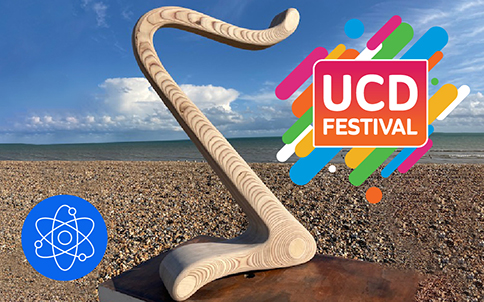UCD Discovery delighted to partner on Intel laser harp project
Monday, 28 August, 2023
At UCD Discovery we are all about supporting innovative, cross-disciplinary projects - and if they are beautiful and play music too, even better!
We are delighted to have been involved in bringing to UCD the Intel laser harp, a stunning piece of design engineering. It will be officially unveiled as part of the 2021 UCD festival.

This is the second virtual UCD Festival@home and the 2021 programme offers over 100 free online events, bringing together the global UCD community of students, alumni, future students and the general public. The wide appeal of the programme is mirrored in the inclusive design of the Intel laser harp, which is wheelchair accessible and created for public interaction.
“Through the very kind gift from Intel, UCD was able to bring the vision of the laser harp to life,” says Prof Patricia Maguire, Director of UCD Institute of Discovery.
“Intel is a main sponsor for the UCD Festival and we would like to take this opportunity to thank them for their generosity and imagination on this laser harp partnership. At UCD we are looking forward to exploring all engagement possibilities for the laser harp - along with opportunities for new and innovative industry partnerships.”
UCD Discovery’s Outreach and Impact Scientist Phil Smyth managed the highly collaborative Intel laser harp project, together with UCD Explore, a programme offering an exciting and educational space for primary school children from disadvantaged areas, where they can play, learn and explore science.
Today he joins Intel CEO Eamon Sinnott and harpist Charlotte Arnold, who will play an original composition on the laser harp to launch the Science programme of festival events. Charlotte composed the piece of music on her own Irish harp and will play the laser harp over this track, fusing the traditional with the modern.
Handbuilt by UK artist-engineer Thomas Freer, the harp is a ‘therapeutic musical sculpture’ built to ‘explore, excite and awaken the senses’ and fitted with ‘blisteringly quick electronics’.
But how does it work?
“The lasers are set out in a pentatonic scale and when your finger breaks the laser beam, it plays the sound,” explains Phil. “What’s really snazzy about the harp is that because it is a computer you can make that sound be anything you like - an electric guitar, someone’s beautiful singing voice or different cow sounds. There are all kinds of combinations and creativity you can bring to it.”
Designed as a musical instrument for non-musicians, unlike a traditional harp the laser version does not sit on the shoulder and no matter where you break the laser ‘string’, it will still make the same sound. On a traditional harp, the finger’s position on the string - whether higher up or lower down - will alternate the sound. Made from polished laminate, the harp incorporates a piece of wood from a Duke of Wellington cedar which was planted in 1827 and controversially felled as dangerous by the UK National Trust in 2013.
“The Duke of Wellington was born in Dublin and then moved to the UK. This Duke of Wellington tree was in the UK and now part of it is coming back to Dublin. So there is a real connection there,” says Phil. “We wanted to create something that represented that connection between the Republic of Ireland and the UK, particularly since Brexit.”
After the UCD festival, there are wide-ranging ambitions for the laser harp.
“There are rumours of it going to Dingle for the Other Voices music festival. The beauty of it is that it can tour. Along with making it available for people to play in UCD, we would love to be able to bring it into schools when it is safe to do so.”
The laser harp’s storage box is itself a work of art. Coasters can be added when it travels and if you flip the box upside down, it becomes a stand for the instrument.
“It is such a well-engineered piece. Our idea is to have it both on tour and in-situ in UCD. But rather than art just sitting there and being beautiful, this is functional art, which will be played with and enjoyed by people young and old for many years to come. It is a really special piece.”
This is a sentiment shared by UCD Discovery’s director. “We are thrilled to see the craftsmanship of the harp, particularly its inclusive design,” says Patricia. “In UCD Discovery, which is a hub for interdisciplinary thought and research, we were also fascinated to hear the blend of music and technology in harpist Charlotte Arnold’s beautiful composition.”